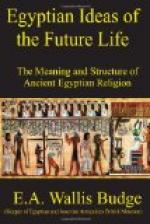The soul was called BA, and the ideas which the Egyptians held concerning it are somewhat difficult to reconcile; the meaning of the word seems to be something like “sublime,” “noble,” “mighty.” The BA dwelt in the KA, and seems to have had the power of becoming corporeal or incorporeal at will; it had both substance and form, and is frequently depicted on the papyri and monuments as a human-headed hawk; in nature and substance it is stated to be ethereal. It had the power to leave the tomb, and to pass up into heaven where it was believed to enjoy an eternal existence in a state of glory; it could, however, and did, revisit the body in the tomb, and from certain texts it seems that it could re-animate it and hold converse with it. Like the heart AB it was, in some respects, the seat of life in man. The souls of the blessed dead dwelt in heaven with the gods, and they partook of all the celestial enjoyments for ever.
The spiritual intelligence, or spirit, of a man was called KHU, and it seems to have taken form as a shining, luminous, intangible shape of the body; the KHUs formed a class of celestial beings who lived with the gods, but their functions are not clear. The KHU, like the KA, could be imprisoned in the tomb, and to obviate this catastrophe special formulae were composed and duly recited. Besides the KHU another very important part of a man’s entity went into heaven, namely, his SEKHEM. The word literally means “to have the mastery over something,” and, as used in the early texts, that which enables one to have the mastery over something; i.e., “power.” The SEKHEM of a man was, apparently, his vital force or strength personified, and the Egyptians believed that it could and did, under certain conditions, follow him that possessed it upon earth into heaven. Another part of a man was the KHAIBIT or “shadow,” which is frequently mentioned in connexion with the soul and, in late times, was always thought to be near it. Finally we may mention the REN, or “name” of a man, as one of his most important constituent parts. The Egyptians, in common with all Eastern nations, attached the greatest importance to the preservation of the name, and any person, who effected the blotting out of a man’s name was thought to have destroyed him also. Like the KA it was a portion, of a man’s most special identity, and it is easy to see why so much importance grew to be attached to it; a nameless being could not be introduced to the gods, and as no created thing exists without a name the man who had no name was in a worse position before the divine powers than the feeblest inanimate object. To perpetuate the name of a father was a good son’s duty, and to keep the tombs of the dead in good repair so that all might read the names of those who were buried in them was a most meritorious act. On the other hand, if the deceased knew the names of divine beings, whether friends or foes, and could pronounce them, he at once obtained power over them, and was able to make them perform his will.




